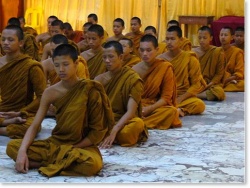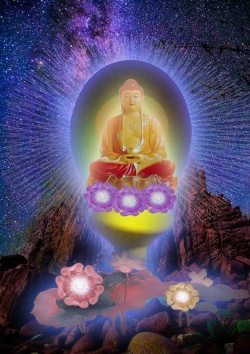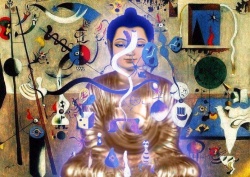Daily Life in the Monastery
VDN Entry Guidelines
The purpose of Vajra Dakini Nunnery is to benefit all beings through prayer and service. We are a Drikung nunnery and we are open to nuns of all nationalities and lineages who wish training in monastic life. We welcome lay aspirants who wish to explore monastic life with us as well.
Monastic life in the 21st century at Vajra Dakini is viewed as a compassion college with training in study, practice and service. Nuns will find their vows supported at Vajra Dakini and monastic training for deepening their understanding of the potential of monastic life to be a path of transformation.
Community: Some of the most valuable training comes from living in community. Mindfulness, kindness and respect are key. A well disciplined one blends into a community like milk into water. We recommend that every monastic spend up to two years in a monastery to become strong and confident in their vows and monastic ways of life.
Recognizing that this is not always possible, we offer residencies of various lengths for guest nuns for training purposes. We also offer retreats in which monks can join in training.
Ordination Opportunities: Vajra Dakini Nunnery offers pre and post ordination training. We recommend that ordination follow training. One is invited to first visit the nunnery and to participate in activities. You may then apply for a month residency as an aspirant. Following that 6 month- one year residencies are available. During this period you can apply for temporary ordination. If you and the community see that this way of life is beneficial, you are invited to enter novice training.
Ordination Levels at Vajra Dakini:
Lay Members: Committed lay sangha members who participate in meditation programs and retreats but do not live at the nunnery, may choose to take Refuge vows
Aspirant: Five Lay vows with celibacy while you live at the nunnery
Parma Rabjung: Five Lay vows including celibacy with the life time intention of becoming a nun.
Novice/Getsul Vows Ten/Thirty six vows
Bhiksuni/ Gelongma Vows Three hundred forty eight vows
Schedule: Our lives are defined by a schedule that supports practice time and contemplation of the Four Mindfulnesses. The day, mostly silent, begins and ends with community prayer. Lights out at 10 pm for trainees, so that health is maintained. Mornings between 9 and 11 are reserved for individual meditation.
You will have an interview with Khenmo upon arriving to discuss your individual practice. The natural changes of the seasons also define our way of life. In the Winter there is more retreat, other times of the year will be set aside for study. As you become a committed member of the community, solitary retreat times of the year will be determined.
Daily Schedule
5:00 – 6:00 Rising and first individual session
6:30 – 7:30 Morning Community Meditation
8:00 Breakfast
8:30 House jobs rota
9:00 – 11:00 Individual meditation
11:00 -12:00 Exercise, study, cooking rota
12:00 -1:00 Lunch & clean up
2:00 – 6:00 Work
6:30 – 7:00 Medicine Meal
7:00- 8:00 Protector Practice, Amitabha, Prayers for Community
8:00 - 9:00 Individual meditation/study
Practice: We practice mediation approximately 4-5 hours a day. Community practices are Drikung Kagyu. Every resident will meet with Khenmo Drolma to discuss their practice. During your individual practice time you may practice as a qualified Buddhist teacher or Root Lama has advised that are also within the generally approved Drikung Tibetan systems.
Governance: Nunneries operate by the Vinaya which is a particular kind of consensus. As you become part of the community, you will be living in a culture guided by a template that has created harmony among nuns for thousands of years. The Vinaya offers guidelines for mindful behavior.
It is designed to allow our desires and repulsions to become apparent to us so that we can let them dissipate. Gradually, our minds become free. Our nature as compassionate wise women is revealed. This is why you came.
As this is a lived experience, length of ordination is valued. Those with more experience are considered treasured guides and mentors. The fully ordained are given the responsibility of community decisions and integrating the customs into the 21st century. The decisions of the monastery are made by a consensus of the fully ordained. Thus all voices are heard and valued once the way of life is understood.
Diet: We eat simple vegetarian meals. Our main meal is at mid day. In the evenings we have a medicine meal that is generally soup or protein drinks. The diet is designed to have a variety of soy and legume proteins, low fat, low dairy. No onions or garlic are consumed ( a Vinaya rule). For those who need some meat products during a long term stay, occasional meat meals may be permitted.
Possessions: We live simply, and you may bring up to two large suitcases. Deciding what to bring with you is challenging. You will probably share a room. For many it has been a long time since we have shared space with strangers. The rooms have a small closet and only a small space for personal altar items. A personal computer for study is allowed and we have a library. Internet is limited to nunnery work except during a brief recreational time when you can use it for contacting family and friends. Those who choose to enter the novice training will be asked to let go of their cars for that period.
Money and Travel: Aspirant and novice training is designed to pacify your mind and encourage simplicity in all aspects of life. It will be rare for you to go beyond the property. You will have little need for personal money or bank accounts. It is good to bring a credit card or a small amount of cash that can be put in your name in the nunnery account, for toiletries and emergencies.
You will need health insurance or travel insurance that covers health care and funds for dental emergencies. Fully ordained nuns who are VDN members are considering a trust situation similar to the Sisters of St. Joseph in which any personal money is put into a trust. You will need to arrange transportation to Vajra Dakini and from the nunnery at the end of your stay.
Health: Just as you would plan for a long trip, you need to have medical and dental check ups before a lengthy stay at the nunnery as well as have your own health insurance. Visits over a month long will be preceded by a health certificate. Should an emergency arise during your stay, we can assist you in receiving treatment. We are unable offer health care at this time.
Should you become seriously ill you will need a safety net of friends and or family to assist you. Member nuns can receive Vermont health insurance. This is a universal plan according to income, and mendicants are covered. Every resident is expected to follow the full schedule.
Work: Every resident works to sustain the nunnery, generally 4 - 5 hours a day. During public program times we join in together to get all the work done. You will need work clothes appropriate for a variety of tasks including outdoor landscaping and painting. Dharma work, house work, cooking and simple office jobs are done by residents.
Evaluation: At the end of the first week and then periodically after that, there will be evaluations to see if monastic life at VDN is beneficial for you and for the community.





